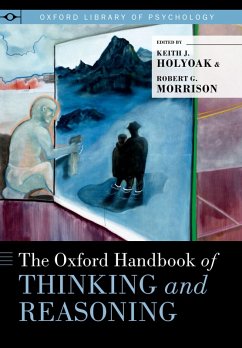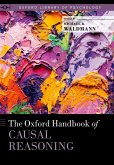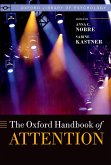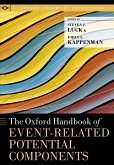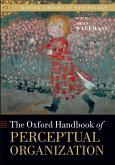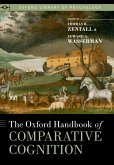The Oxford Handbook of Thinking and Reasoning (eBook, PDF)
Redaktion: Holyoak; Morrison
64,95 €
64,95 €
inkl. MwSt.
Sofort per Download lieferbar

32 °P sammeln
64,95 €
Als Download kaufen

64,95 €
inkl. MwSt.
Sofort per Download lieferbar

32 °P sammeln
Jetzt verschenken
Alle Infos zum eBook verschenken
64,95 €
inkl. MwSt.
Sofort per Download lieferbar
Alle Infos zum eBook verschenken

32 °P sammeln
The Oxford Handbook of Thinking and Reasoning (eBook, PDF)
Redaktion: Holyoak; Morrison
- Format: PDF
- Merkliste
- Auf die Merkliste
- Bewerten Bewerten
- Teilen
- Produkt teilen
- Produkterinnerung
- Produkterinnerung

Bitte loggen Sie sich zunächst in Ihr Kundenkonto ein oder registrieren Sie sich bei
bücher.de, um das eBook-Abo tolino select nutzen zu können.
Hier können Sie sich einloggen
Hier können Sie sich einloggen
Sie sind bereits eingeloggt. Klicken Sie auf 2. tolino select Abo, um fortzufahren.

Bitte loggen Sie sich zunächst in Ihr Kundenkonto ein oder registrieren Sie sich bei bücher.de, um das eBook-Abo tolino select nutzen zu können.
The Oxford Handbook of Thinking and Reasoning brings together the contributions of many of the leading researchers in thinking and reasoning to create the most comprehensive overview of research on thinking and reasoning that has ever been available. Each chapter includes a bit of historical perspective on the topic, and concludes with some thoughts about where the field seems to be heading.
- Geräte: PC
- mit Kopierschutz
- eBook Hilfe
- Größe: 18.19MB
Andere Kunden interessierten sich auch für
![The Oxford Handbook of Causal Reasoning (eBook, PDF) The Oxford Handbook of Causal Reasoning (eBook, PDF)]() The Oxford Handbook of Causal Reasoning (eBook, PDF)139,95 €
The Oxford Handbook of Causal Reasoning (eBook, PDF)139,95 €![The Oxford Handbook of Attention (eBook, PDF) The Oxford Handbook of Attention (eBook, PDF)]() The Oxford Handbook of Attention (eBook, PDF)43,95 €
The Oxford Handbook of Attention (eBook, PDF)43,95 €![The Oxford Handbook of Empirical Aesthetics (eBook, PDF) The Oxford Handbook of Empirical Aesthetics (eBook, PDF)]() Marcos NadalThe Oxford Handbook of Empirical Aesthetics (eBook, PDF)101,95 €
Marcos NadalThe Oxford Handbook of Empirical Aesthetics (eBook, PDF)101,95 €![The Oxford Handbook of Event-Related Potential Components (eBook, PDF) The Oxford Handbook of Event-Related Potential Components (eBook, PDF)]() The Oxford Handbook of Event-Related Potential Components (eBook, PDF)133,95 €
The Oxford Handbook of Event-Related Potential Components (eBook, PDF)133,95 €![The Oxford Handbook of Perceptual Organization (eBook, PDF) The Oxford Handbook of Perceptual Organization (eBook, PDF)]() The Oxford Handbook of Perceptual Organization (eBook, PDF)116,95 €
The Oxford Handbook of Perceptual Organization (eBook, PDF)116,95 €![The Oxford Handbook of Spontaneous Thought (eBook, PDF) The Oxford Handbook of Spontaneous Thought (eBook, PDF)]() The Oxford Handbook of Spontaneous Thought (eBook, PDF)98,95 €
The Oxford Handbook of Spontaneous Thought (eBook, PDF)98,95 €![The Oxford Handbook of Comparative Cognition (eBook, PDF) The Oxford Handbook of Comparative Cognition (eBook, PDF)]() The Oxford Handbook of Comparative Cognition (eBook, PDF)153,95 €
The Oxford Handbook of Comparative Cognition (eBook, PDF)153,95 €-
-
-
The Oxford Handbook of Thinking and Reasoning brings together the contributions of many of the leading researchers in thinking and reasoning to create the most comprehensive overview of research on thinking and reasoning that has ever been available. Each chapter includes a bit of historical perspective on the topic, and concludes with some thoughts about where the field seems to be heading.
Dieser Download kann aus rechtlichen Gründen nur mit Rechnungsadresse in A, B, BG, CY, CZ, D, DK, EW, E, FIN, F, GR, HR, H, IRL, I, LT, L, LR, M, NL, PL, P, R, S, SLO, SK ausgeliefert werden.
Produktdetails
- Produktdetails
- Verlag: Oxford University Press
- Erscheinungstermin: 21. März 2012
- Englisch
- ISBN-13: 9780199938308
- Artikelnr.: 72256096
- Verlag: Oxford University Press
- Erscheinungstermin: 21. März 2012
- Englisch
- ISBN-13: 9780199938308
- Artikelnr.: 72256096
- Herstellerkennzeichnung Die Herstellerinformationen sind derzeit nicht verfügbar.
Keith J. Holyoak, Ph.D., Distinguished Professor of Psychology at the University of California, Los Angeles, is a leading researcher in human thinking and reasoning. Robert G. Morrison, Ph.D., Assistant Professor of Psychology and Neuroscience at Loyola University Chicago, seeks to understand how memory and reasoning develop throughout the lifespan.
* 1. Thinking and Reasoning: A Reader's Guide
* Keith J. Holyoak and Robert G. Morrison
* Part One: General Approaches to Thinking and Reasoning
* 2. Normative Systems: Logic, Probability, and Rational Choice
* Nick Chater and Mike Oaksford
* 3. Bayesian Inference
* Tom Griffiths, Josh Tenenbaum, and Charles Kemp
* 4. Knowledge Representation
* Arthur B. Markman
* 5. Computational Modeling of Higher Cognition
* Leonidas A. A. Doumas and John E. Hummel
* 6. Neurocognitive Methods in Higher Cognition
* Robert G. Morrison and Barbara Knowlton
* 7. Mental Function as Genetic Expression: Emerging Insights from
Cognitive Neurogenetics
* Adam E. Green and Kevin N. Dunbar
* Part Two: Deductive, Inductive, and Abductive Reasoning
* 8. Dual-process Theories of Reasoning: Facts and Fallacies
* Jonathan St. B. T. Evans
* 9. Inference in Mental Models
* P. N. Johnson-Laird
* 10. Similarity
* Robert L. Goldstone and Ji Yun Son
* 11. Concepts and Categories: Memory, Meaning, and Metaphysics
* Lance J. Rips, Edward E. Smith, and Douglas L. Medin
* 12. Causal Learning and Inference
* Marc Buehner and Patricia W. Cheng
* 13. Analogy and Relational Reasoning
* Keith J. Holyoak
* 14. Explanation and Abductive Inference
* Tania Lombrozo
* 15. Rational Argument
* Ulrike Hahn and Mike Oaksford
* Part Three: Judgment and Decision Making
* 16. Decision Making
* Robyn A. LeBoeuf and Eldar Shafir
* 17. Judgment Heuristics
* Dale Griffin
* 18. Cognitive Hierarchies and Emotions in Behavioral Game Theory
* Colin Camerer and Alec Smith
* 19. Moral Judgment
* Michael Waldmann, Jonas Nagel, and Alex Wiegmann
* 20. Motivated Thinking
* Daniel C. Molden and E. Tory Higgins
* Part Four: Problem Solving, Intelligence, and Creative Thinking
* 21. Problem Solving
* Miriam Bassok and Laura R. Novick
* 22. On the Distinction between Rationality and Intelligence:
Implications for Understanding Individual Differences in Reasoning
* Keith E. Stanovich
* 23. Cognition and the Creation of Ideas
* Steve M. Smith and Tom B. Ward
* 24. Insight
* J. Jason van Steenburgh, Jessica I. Fleck, Mark Beeman, and John
Kounios
* 25. Genius
* Dean Keith Simonton
* Part Five: Ontogeny, Phylogeny, Language, and Culture
* 26. Development of Thinking in Children
* Susan A. Gelman and Brandy N. Frazier
* 27. The Human Enigma
* Derek Penn and Dan Povinelli
* 28. Language and Thought
* Lila Gleitman and Anna Papafragou
* 29. Thinking in Society and Culture
* Tage Rai
* Part Six: Modes of Thinking
* 30. Development of Quantitative Thinking
* John Opfer and Robert Siegler
* 31. Visuospatial Thinking
* Mary Hegarty and Andrew T. Stull
* 32. Gesture in Thought
* Susan Goldin-Meadow and Susan Wagner Cook
* 33. Impact of Aging on Thinking
* Shannon McGillivray, Michael C. Friedman, and Alan D. Castel
* 34. The Cognitive Neuroscience of Thought Disorder in Schizophrenia
* Peter Bachman and Tyrone D. Cannon
* Part Seven: Thinking in Practice
* 35. Scientific Thinking and Reasoning
* Kevin N. Dunbar and David Klahr
* 36. Legal Reasoning
* Barbara A. Spellman and Fred Schauer
* 37. Medical Reasoning and Thinking
* Vimla L. Patel, Jose F. Arocha, and Jiajie Zhang
* 38. Thinking in Business
* Jeffrey Lowenstein
* 39. Musical Thought
* William Forde Thompson and Paolo Ammirante
* 40. Learning to Think: Cognitive Mechanisms of Knowledge Transfer
* Ken Koedinger and Ido Roll
* Keith J. Holyoak and Robert G. Morrison
* Part One: General Approaches to Thinking and Reasoning
* 2. Normative Systems: Logic, Probability, and Rational Choice
* Nick Chater and Mike Oaksford
* 3. Bayesian Inference
* Tom Griffiths, Josh Tenenbaum, and Charles Kemp
* 4. Knowledge Representation
* Arthur B. Markman
* 5. Computational Modeling of Higher Cognition
* Leonidas A. A. Doumas and John E. Hummel
* 6. Neurocognitive Methods in Higher Cognition
* Robert G. Morrison and Barbara Knowlton
* 7. Mental Function as Genetic Expression: Emerging Insights from
Cognitive Neurogenetics
* Adam E. Green and Kevin N. Dunbar
* Part Two: Deductive, Inductive, and Abductive Reasoning
* 8. Dual-process Theories of Reasoning: Facts and Fallacies
* Jonathan St. B. T. Evans
* 9. Inference in Mental Models
* P. N. Johnson-Laird
* 10. Similarity
* Robert L. Goldstone and Ji Yun Son
* 11. Concepts and Categories: Memory, Meaning, and Metaphysics
* Lance J. Rips, Edward E. Smith, and Douglas L. Medin
* 12. Causal Learning and Inference
* Marc Buehner and Patricia W. Cheng
* 13. Analogy and Relational Reasoning
* Keith J. Holyoak
* 14. Explanation and Abductive Inference
* Tania Lombrozo
* 15. Rational Argument
* Ulrike Hahn and Mike Oaksford
* Part Three: Judgment and Decision Making
* 16. Decision Making
* Robyn A. LeBoeuf and Eldar Shafir
* 17. Judgment Heuristics
* Dale Griffin
* 18. Cognitive Hierarchies and Emotions in Behavioral Game Theory
* Colin Camerer and Alec Smith
* 19. Moral Judgment
* Michael Waldmann, Jonas Nagel, and Alex Wiegmann
* 20. Motivated Thinking
* Daniel C. Molden and E. Tory Higgins
* Part Four: Problem Solving, Intelligence, and Creative Thinking
* 21. Problem Solving
* Miriam Bassok and Laura R. Novick
* 22. On the Distinction between Rationality and Intelligence:
Implications for Understanding Individual Differences in Reasoning
* Keith E. Stanovich
* 23. Cognition and the Creation of Ideas
* Steve M. Smith and Tom B. Ward
* 24. Insight
* J. Jason van Steenburgh, Jessica I. Fleck, Mark Beeman, and John
Kounios
* 25. Genius
* Dean Keith Simonton
* Part Five: Ontogeny, Phylogeny, Language, and Culture
* 26. Development of Thinking in Children
* Susan A. Gelman and Brandy N. Frazier
* 27. The Human Enigma
* Derek Penn and Dan Povinelli
* 28. Language and Thought
* Lila Gleitman and Anna Papafragou
* 29. Thinking in Society and Culture
* Tage Rai
* Part Six: Modes of Thinking
* 30. Development of Quantitative Thinking
* John Opfer and Robert Siegler
* 31. Visuospatial Thinking
* Mary Hegarty and Andrew T. Stull
* 32. Gesture in Thought
* Susan Goldin-Meadow and Susan Wagner Cook
* 33. Impact of Aging on Thinking
* Shannon McGillivray, Michael C. Friedman, and Alan D. Castel
* 34. The Cognitive Neuroscience of Thought Disorder in Schizophrenia
* Peter Bachman and Tyrone D. Cannon
* Part Seven: Thinking in Practice
* 35. Scientific Thinking and Reasoning
* Kevin N. Dunbar and David Klahr
* 36. Legal Reasoning
* Barbara A. Spellman and Fred Schauer
* 37. Medical Reasoning and Thinking
* Vimla L. Patel, Jose F. Arocha, and Jiajie Zhang
* 38. Thinking in Business
* Jeffrey Lowenstein
* 39. Musical Thought
* William Forde Thompson and Paolo Ammirante
* 40. Learning to Think: Cognitive Mechanisms of Knowledge Transfer
* Ken Koedinger and Ido Roll
* 1. Thinking and Reasoning: A Reader's Guide
* Keith J. Holyoak and Robert G. Morrison
* Part One: General Approaches to Thinking and Reasoning
* 2. Normative Systems: Logic, Probability, and Rational Choice
* Nick Chater and Mike Oaksford
* 3. Bayesian Inference
* Tom Griffiths, Josh Tenenbaum, and Charles Kemp
* 4. Knowledge Representation
* Arthur B. Markman
* 5. Computational Modeling of Higher Cognition
* Leonidas A. A. Doumas and John E. Hummel
* 6. Neurocognitive Methods in Higher Cognition
* Robert G. Morrison and Barbara Knowlton
* 7. Mental Function as Genetic Expression: Emerging Insights from
Cognitive Neurogenetics
* Adam E. Green and Kevin N. Dunbar
* Part Two: Deductive, Inductive, and Abductive Reasoning
* 8. Dual-process Theories of Reasoning: Facts and Fallacies
* Jonathan St. B. T. Evans
* 9. Inference in Mental Models
* P. N. Johnson-Laird
* 10. Similarity
* Robert L. Goldstone and Ji Yun Son
* 11. Concepts and Categories: Memory, Meaning, and Metaphysics
* Lance J. Rips, Edward E. Smith, and Douglas L. Medin
* 12. Causal Learning and Inference
* Marc Buehner and Patricia W. Cheng
* 13. Analogy and Relational Reasoning
* Keith J. Holyoak
* 14. Explanation and Abductive Inference
* Tania Lombrozo
* 15. Rational Argument
* Ulrike Hahn and Mike Oaksford
* Part Three: Judgment and Decision Making
* 16. Decision Making
* Robyn A. LeBoeuf and Eldar Shafir
* 17. Judgment Heuristics
* Dale Griffin
* 18. Cognitive Hierarchies and Emotions in Behavioral Game Theory
* Colin Camerer and Alec Smith
* 19. Moral Judgment
* Michael Waldmann, Jonas Nagel, and Alex Wiegmann
* 20. Motivated Thinking
* Daniel C. Molden and E. Tory Higgins
* Part Four: Problem Solving, Intelligence, and Creative Thinking
* 21. Problem Solving
* Miriam Bassok and Laura R. Novick
* 22. On the Distinction between Rationality and Intelligence:
Implications for Understanding Individual Differences in Reasoning
* Keith E. Stanovich
* 23. Cognition and the Creation of Ideas
* Steve M. Smith and Tom B. Ward
* 24. Insight
* J. Jason van Steenburgh, Jessica I. Fleck, Mark Beeman, and John
Kounios
* 25. Genius
* Dean Keith Simonton
* Part Five: Ontogeny, Phylogeny, Language, and Culture
* 26. Development of Thinking in Children
* Susan A. Gelman and Brandy N. Frazier
* 27. The Human Enigma
* Derek Penn and Dan Povinelli
* 28. Language and Thought
* Lila Gleitman and Anna Papafragou
* 29. Thinking in Society and Culture
* Tage Rai
* Part Six: Modes of Thinking
* 30. Development of Quantitative Thinking
* John Opfer and Robert Siegler
* 31. Visuospatial Thinking
* Mary Hegarty and Andrew T. Stull
* 32. Gesture in Thought
* Susan Goldin-Meadow and Susan Wagner Cook
* 33. Impact of Aging on Thinking
* Shannon McGillivray, Michael C. Friedman, and Alan D. Castel
* 34. The Cognitive Neuroscience of Thought Disorder in Schizophrenia
* Peter Bachman and Tyrone D. Cannon
* Part Seven: Thinking in Practice
* 35. Scientific Thinking and Reasoning
* Kevin N. Dunbar and David Klahr
* 36. Legal Reasoning
* Barbara A. Spellman and Fred Schauer
* 37. Medical Reasoning and Thinking
* Vimla L. Patel, Jose F. Arocha, and Jiajie Zhang
* 38. Thinking in Business
* Jeffrey Lowenstein
* 39. Musical Thought
* William Forde Thompson and Paolo Ammirante
* 40. Learning to Think: Cognitive Mechanisms of Knowledge Transfer
* Ken Koedinger and Ido Roll
* Keith J. Holyoak and Robert G. Morrison
* Part One: General Approaches to Thinking and Reasoning
* 2. Normative Systems: Logic, Probability, and Rational Choice
* Nick Chater and Mike Oaksford
* 3. Bayesian Inference
* Tom Griffiths, Josh Tenenbaum, and Charles Kemp
* 4. Knowledge Representation
* Arthur B. Markman
* 5. Computational Modeling of Higher Cognition
* Leonidas A. A. Doumas and John E. Hummel
* 6. Neurocognitive Methods in Higher Cognition
* Robert G. Morrison and Barbara Knowlton
* 7. Mental Function as Genetic Expression: Emerging Insights from
Cognitive Neurogenetics
* Adam E. Green and Kevin N. Dunbar
* Part Two: Deductive, Inductive, and Abductive Reasoning
* 8. Dual-process Theories of Reasoning: Facts and Fallacies
* Jonathan St. B. T. Evans
* 9. Inference in Mental Models
* P. N. Johnson-Laird
* 10. Similarity
* Robert L. Goldstone and Ji Yun Son
* 11. Concepts and Categories: Memory, Meaning, and Metaphysics
* Lance J. Rips, Edward E. Smith, and Douglas L. Medin
* 12. Causal Learning and Inference
* Marc Buehner and Patricia W. Cheng
* 13. Analogy and Relational Reasoning
* Keith J. Holyoak
* 14. Explanation and Abductive Inference
* Tania Lombrozo
* 15. Rational Argument
* Ulrike Hahn and Mike Oaksford
* Part Three: Judgment and Decision Making
* 16. Decision Making
* Robyn A. LeBoeuf and Eldar Shafir
* 17. Judgment Heuristics
* Dale Griffin
* 18. Cognitive Hierarchies and Emotions in Behavioral Game Theory
* Colin Camerer and Alec Smith
* 19. Moral Judgment
* Michael Waldmann, Jonas Nagel, and Alex Wiegmann
* 20. Motivated Thinking
* Daniel C. Molden and E. Tory Higgins
* Part Four: Problem Solving, Intelligence, and Creative Thinking
* 21. Problem Solving
* Miriam Bassok and Laura R. Novick
* 22. On the Distinction between Rationality and Intelligence:
Implications for Understanding Individual Differences in Reasoning
* Keith E. Stanovich
* 23. Cognition and the Creation of Ideas
* Steve M. Smith and Tom B. Ward
* 24. Insight
* J. Jason van Steenburgh, Jessica I. Fleck, Mark Beeman, and John
Kounios
* 25. Genius
* Dean Keith Simonton
* Part Five: Ontogeny, Phylogeny, Language, and Culture
* 26. Development of Thinking in Children
* Susan A. Gelman and Brandy N. Frazier
* 27. The Human Enigma
* Derek Penn and Dan Povinelli
* 28. Language and Thought
* Lila Gleitman and Anna Papafragou
* 29. Thinking in Society and Culture
* Tage Rai
* Part Six: Modes of Thinking
* 30. Development of Quantitative Thinking
* John Opfer and Robert Siegler
* 31. Visuospatial Thinking
* Mary Hegarty and Andrew T. Stull
* 32. Gesture in Thought
* Susan Goldin-Meadow and Susan Wagner Cook
* 33. Impact of Aging on Thinking
* Shannon McGillivray, Michael C. Friedman, and Alan D. Castel
* 34. The Cognitive Neuroscience of Thought Disorder in Schizophrenia
* Peter Bachman and Tyrone D. Cannon
* Part Seven: Thinking in Practice
* 35. Scientific Thinking and Reasoning
* Kevin N. Dunbar and David Klahr
* 36. Legal Reasoning
* Barbara A. Spellman and Fred Schauer
* 37. Medical Reasoning and Thinking
* Vimla L. Patel, Jose F. Arocha, and Jiajie Zhang
* 38. Thinking in Business
* Jeffrey Lowenstein
* 39. Musical Thought
* William Forde Thompson and Paolo Ammirante
* 40. Learning to Think: Cognitive Mechanisms of Knowledge Transfer
* Ken Koedinger and Ido Roll
